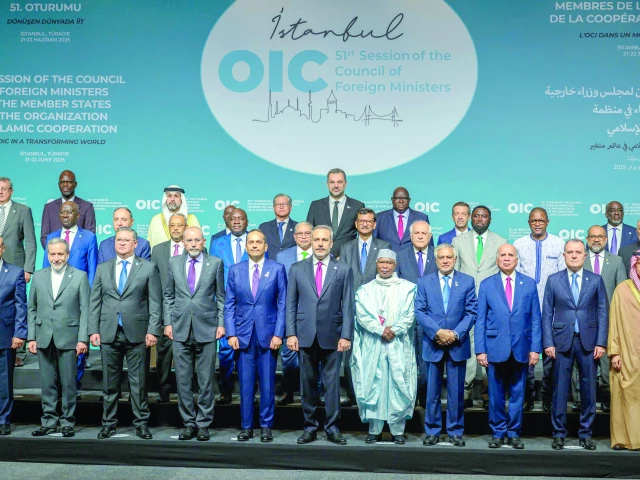Dar says Israeli aggression threatens regional stability
Iran threatens 'more devastating' response to Israel's attacks

Deputy Prime Minister/Foreign Minister Ishaq Dar has emphasised the urgent need for unity among Muslim nations to confront growing challenges facing the Ummah.
Addressing the 51st session of the Organization of Islamic Cooperation (OIC) Council of Foreign Ministers in Istanbul, the deputy prime minister strongly condemned Israel's recent attacks on Iran, calling them a blatant violation of the United Nations Charter.
He warned that the rising tensions in the Middle East, fueled by Israeli aggression, pose a serious threat to regional peace and stability.
Calling for an immediate and unconditional ceasefire in Gaza, the foreign minister denounced the ongoing genocide of Palestinians, highlighting the tragic loss of thousands of innocent lives, including women and children.
"The time has come for the Muslim Ummah to unite," Dar stressed. "The OIC is expected to play a decisive and leading role in addressing these critical issues."
He also raised serious concerns over India's actions in the region, accusing New Delhi of weaponizing water resources against Pakistan. "Blocking Pakistan's water is tantamount to declaring war," he asserted.
Dar reiterated Pakistan's call for the resolution of the Jammu and Kashmir dispute in accordance with United Nations Security Council resolutions. He condemned Indian aggression and said that India had targeted innocent Pakistani civilians. In response, Pakistan exercised its right to self-defense, he added.
Highlighting the growing issue of Islamophobia, the deputy prime minister called for collective action by the Muslim world to counter rising anti-Islam sentiment globally.
He also extended his gratitude to Turkish President Recep Tayyip Erdogan and the Turkish leadership for their warm hospitality during the conference.
Turkish President Recep Tayyip Erdogan accused Western leaders of providing "unconditional support" to Israel.
A trenchant critic of Israel's actions in both Gaza and Iran, Erdogan called for "high-level peace talks" between Tehran and the United States, according to his office, adding that Turkey was ready to play a "facilitator" role to help bring an end to the war.
Erdogan, who met Iranian foreign minister Abbas Araghchi on the sidelines of Saturday's meeting, said Turkey would not allow borders in the Middle East to be redrawn "in blood".
"It is vital for us to show more solidarity to end Israel's banditry — not only in Palestine but also in Syria, in Lebanon and in Iran," he told the OIC's 57 member countries.
According to Qatar's foreign ministry, Araghchi also met the Gulf state's top diplomat in Istanbul, who said he was working to bring the sides "back to the path of dialogue".
Iran's President Masoud Pezeshkian warned of a "more devastating" retaliation should Israel's nine-day bombing campaign continue, saying the Islamic republic would not halt its nuclear programme "under any circumstances".
Israel said on Saturday it had killed three more Iranian commanders in its unprecedented offensive, while Foreign Minister Gideon Saar claimed the campaign had delayed Tehran's alleged progress towards a nuclear weapon by two years.
"We will do everything that we can do there in order to remove this threat," Saar told the German newspaper Bild, asserting Israel would keep up its onslaught.
Israel and Iran have traded wave after wave of devastating strikes since Israel launched its aerial campaign on June 13, saying Tehran was on the verge of developing a nuclear weapon.
Iran denies seeking an atomic bomb, and on Saturday Pezeshkian said its right to pursue a civilian nuclear programme "cannot be taken away... by threats or war".
In a phone call with French President Emmanuel Macron, Pezeshkian said Iran was "ready to discuss and cooperate to build confidence in the field of peaceful nuclear activities".
"However, we do not agree to reduce nuclear activities to zero under any circumstances," he added, according to Iran's official IRNA news agency.
Referring to the Israeli attacks, he said: "Our response to the continued aggression of the Zionist regime will be more devastating."
Israel's military earlier said that a strike in Qom, south of Tehran, killed Saeed Izadi, a top Revolutionary Guards official in charge of coordination with Hamas. Two other commanders were killed overnight, it added.
Israel said it had also attacked Iran's Isfahan nuclear site for a second time, with the UN nuclear watchdog later reporting that a centrifuge manufacturing workshop had been hit.
Top diplomats from Britain, France and Germany met Araghchi in Geneva on Friday and urged him to resume nuclear talks with the United States that had been derailed by the war.
But Araghchi told NBC News that "we're not prepared to negotiate with them (the Americans) anymore, as long as the aggression continues".
Trump, dismissive of European diplomatic efforts, said he was unlikely to ask Israel to stop its attacks to get Iran back to the table.
"If somebody's winning, it's a little bit harder to do," he said of Israel's campaign.
Any US involvement would likely feature powerful bunker-busting bombs that no other country possesses to destroy an underground uranium enrichment facility in Fordo.
(With additional input from News Desk)



1724319076-0/Untitled-design-(5)1724319076-0-208x130.webp)















COMMENTS
Comments are moderated and generally will be posted if they are on-topic and not abusive.
For more information, please see our Comments FAQ